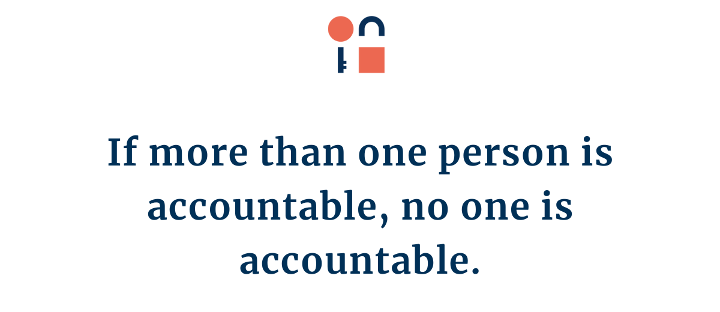Accountability Is A Culture Issue
Ever heard the quote: “If more than one person is accountable, no one is accountable”? Don’t let this statement be true for your company. Learn how to establish an accountability process for your team today.
Great leaders know that positive accountability creates a culture of trust, engagement, and exceptional performance. When employees can count on one another, they become invested in the company’s success. Your team understands what is expected of them and how to measure when they have met those expectations. Ensuring employees understand their role and how to define success is key to a more effective and happy workforce.
Accountability matters because not having it means no one can be held responsible. This creates a difficult environment to work and grow in.
If you are struggling with:
- Low morale
- Unclear priorities
- Declining engagement
- Ineffective execution
- Low levels of trust
- High turnover
…Accountability might be the issue.

ACCOUNTABILITY
At its root, accountability is a culture issue. Creating accountability is about creating a culture where people understand that accountability involves a certain degree of autonomy. This requires employees to value responsibility, honesty, and trust. Without any of these your employee morale takes a hit and leaves employees feeling lost and unproductive. If they can’t gauge their achievements, they feel devalued. And when employees aren’t valued, they’re less likely to be engaged with their work. This can quickly snowball and leads to everyone being unhappy.
YOU AND ACCOUNTABILITY
Establishing accountability starts at the top. As a business owner, sometimes you are the barrier to accountability. You might want full control of how everything is done. Or… maybe it is the opposite: you are not sure how to delegate the responsibility to someone else or there is a lack of trust of the people on your team. If any of that resonated with you, try this exercise.
Take a moment and scan through the functions of your company. Write down the high-level areas of your company, like finance, human resources, marketing, sales, etc. Then, write the names of those who are accountable for those functions. If…
- You see your name as the CEO come up several times
- You find that the same people are listed over and over again
- You see more than one person listed per function
- There are names of people you would not enthusiastically re-hire
- There is someone on your executive team whose name is NOT listed because of a lack of trust or capability
…then you have an accountability problem. Looking at who is responsible for the functions of your organization, is the first place to start establishing who needs to control what function. Choose ONE person who is accountable for these functions and make it clear they are accountable for that area of the business. It doesn’t mean they have to execute all the work – accountability and responsibility are different – but are overseeing the success of that function.
CONCLUSION
Establishing accountability for your team does not have to be hard. Keep in mind, high performers are not afraid of accountability, in fact, they thrive on it. If you are trying to hire or keep top performers, they’ll know if you’re disorganized or have a less than optimal culture. Once you’ve established accountability on your team, it’s far easier to find, screen, and hire candidates who have the characteristics you’re looking for. With expectations clear and concise, you are also able to help your current team find value and trust in their work and in you as a leader.

Written by Jennifer Faught. Certified Scaling Up Coach and has helped companies establish processes around accountability all over the country.








